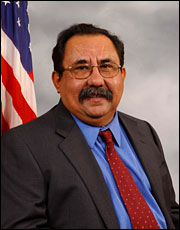
Over the weekend, several news sources reported that Rep. Raúl M. Grijalva (D-Ariz.) is the top name on Obama’s list to head the Interior Department, a job that would put him in charge of federal lands, national parks and endangered species.
Grijalva has represented Arizona’s 7th district since 2003, and has racked up a 95 percent lifetime score from the League of Conservation Voters. He earned an 88 percent from LCV for the 110th Congress. A member of the House Natural Resources Committee and the chair of the Subcommittee on National Parks, Forest and Public Lands, Grijalva has been active on open space preservation, national parks, environmental protections along the U.S.-Mexico border, and renewable energy. In June, he made news by blocking the Bush administration’s plan to mine uranium on one million acres of public land near the Grand Canyon.

“The uniqueness and fragility of the Grand Canyon ecosystem, combined with the legacy of pollution, illness and death left by previous uranium mining, combine to make this the last place on Earth new mining should take place,” he said at the time.
He’s been a leading critic of the Bush administration’s approach to public lands and natural resources. In October, he published a 23-page paper [PDF] with the not-so-subtle title, “The Bush Administration’s Assaults on Our National Parks, Forests and Public Lands.”
In it, he accused the White House of carrying out a “concerted strategy of reducing the protections for our public lands, parks and forests, and opening up these lands for every type of private, commercial and extractive industry possible.” The document is a partial list of the actions he calls the “Bush administration’s legacy of failure to our public lands, parks and forests.”
Grijalva also sponsored the Borderlands Conservation and Security Act in 2007, which targeted plans to build a border fence between the U.S. and Mexico. Instead, it called for allowing experts at the Department of Homeland Security to decide the best form of border security for a particular region, and for those officials to comply with laws protecting “air, water, wildlife, culture, and health and safety.”
Last year, he sponsored legislation to protect black bears, increase funding for the National Park Service, and expand Arizona’s Saguaro National Park. He also sponsored legislation to extend and increase funding for environmental education for Native Americans. He was the sponsor of a bill calling for a change of the tax code so that Indian tribal governments could make use of the production tax credit for renewable energy.
Before going to Congress, Grijalva, the son of a migrant farm worker from Mexico who grew up in Tucson, was a member of the Pima County Board of Supervisors from 1988 to 2002. In that role, he was a big supporter of the Sonoran Desert Conservation Plan to protect species and habitat in the area.
Enviros in Arizona cheered the prospect of Grijalva taking over Interior. “Talk about a 180 from where we are today. That is certainly something that we would love to get behind, something we would cheer,” Richard Mayol, communications director at the Grand Canyon Trust, told the Arizona Republic over the weekend.


